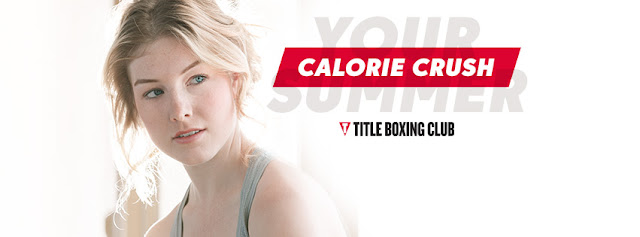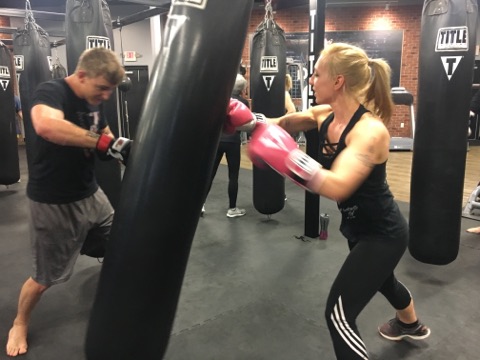Member Spotlight: Emily Wilson
“Oh my gosh, I’m so sorry I’m late!” Emily said
as she came in and greeted me wearing a beautiful, sunny outfit of colorful
pants and a flow-y chiffon shirt.
“Don’t apologize, you aren’t even late I was early!”
I could tell that Emily had probably spent her
life apologizing, but I knew I liked her as soon as we met. She had the most
truly genuine warmth to her-- a little bit nervous but rightly so--she was
about to share her story with someone she barely knew. Emily Wilson might not
be Title’s oldest running member--she and her husband just joined in April--and
she hasn’t achieved her weight loss goals just yet (although she’s made
significant progress--eight pounds and six inches in only a few months!) but
she knows that boxing has become a large part of her identity in just a short
amount of time. The Title family is helping her in a truly powerful way, to win
a lifetime fight against a force that I can scarcely even imagine.
The word “addiction” comes from
a Latin term meaning “enslaved by” or “bound to.” For an addict, life is ruled
by an unstoppable urge that is hard for someone else looking in to understand.
For Emily, her battle began at a young age, a teen who struggled with weight
loss due in part to hypothyroidism and PCOS, she began experimenting with drugs
and alcohol on weekends when she was only 13 years old. Despite growing up with
a loving, supportive family and a happy home, her habits began to spiral.
“I knew right away, it’s
something that any addict knows your first time,” she explained. “There’s this
thing that takes off in your brain like, ‘oh, ok...I like this, I can’t
believe I haven’t had this, I’m going to want this forever, I want nothing
but this.” She found herself cast into an unhealthy social role because
of her weight, and after years of heavy drinking and feeling misunderstood, she
pushed herself to graduate early at 16 and moved out to go to college. From
there, she said, “It was all over.”
When she lived alone, her
recreational drinking quickly devolved into full-blown alcoholism. “I drank to
sleep, I drank alone, I drank 24/7--I even drank before class,” she said with a
twinge of shame in her voice that made me incredibly sad. “I did it to fill a
hole and it had all kinds of consequences, wrecked a car, got a
DUI--relationships with family got rocky but it just continued.” She was sent
to a halfway house in Atlanta at the urging of her family, but negative
influences and self-sabotage set her back; heartbreakingly, she told me, right
before she was set to accomplish 90 days of sobriety.
I wanted to somehow let her
know that there was no judgment here at TBC Clarksville, that no one would
think to blame anyone for succumbing to addiction in this safe place--to food,
drugs or otherwise. Legally, addiction is classified as a disease; Harvard
Mental Health defines it as “a brain disorder characterized by
compulsive engagement in rewarding stimuli, despite adverse consequences" and
PET scans have shown certain people even have a predisposition for it, Emily
has had several other family members who have had addictive tendencies.
Additionally, studies have also
shown that environment is a large contributing factor to whether someone will
engage in substance abuse, and less about the chemical hook as previously
believed. A study conducted by Bruce Alexander, a professor of Psychology in
Vancouver showed the difference between lab rats living in different
environments. A safe, happy environment with plenty of stimuli is not conducive
to addiction, but in isolation--lab rats given a choice between water laced
with cocaine and normal water would become addicted until eventually using
themselves to death.
Emily struggled for years
alone, and then became involved in relationships that furthered her depression
and feelings of being unwanted; eventually leading her to abuse harder drugs.
She became addicted to prescription pain pills after
breaking her back in a car wreck, and from there delved into abuse of cocaine
and methamphetamine--“It was just chaos,” she said. She relapsed into an
abusive relationship and told me that for the longest time she never even
thought that she deserved to get sober.
“There was no fun in it--using all your money,
having to isolate from people, isolate from your family because you don’t want
them to know you’re high but they know you’re high because they know you too
well--then I found out I was pregnant.”
When her own sense of self-worth was not enough
to help her overcome her disease, knowing that she would become a mother
was--it gave her someone else to care for. “I know they say do it for yourself,
but when you just can’t--use whatever you can.” Her daughter was her
motivation; she got sober, left her ex, and went out on her own as a single
mother. She would eventually go on to become a licensed master social worker
and married one of her good friends from college. She and her husband Vincent
now live in Clarksville with their two children (he adopted her daughter from
her first relationship last December).
I could tell that sharing her story was
draining, I asked her if we needed to stop but she said emphatically no, being
able to witness to others is her life’s calling. She works at an addictions
center in Nashville called The Next Door--a faith-based treatment center that specializes in recovery
for women getting out of jail. That’s where the name comes from: “If you pull
open the door and let them out into the world, they’re going to repeat that
over and over until they come to the next door.” They focus on a comprehensive
approach at The Next Door to break the cycle, and do battle constantly
with insurance companies to provide in-house care to recovering addicts (the
alternative for many is homelessness). Emily has helped everyone from sex
trafficking victims to pregnant mothers (The Next Door is one of the only
facilities in the region that helps detox women during pregnancy, the liability
and legal risk has prevented most care facilities from even treating them).
She is able to do her job because she has been
there, her advice comes from a place of humility--not superiority. “I
definitely don’t have it all figured out yet,” she said, “But I can show them
that I’m trying.” Addiction is not about the drugs themselves--it’s about a
void; an acute dissatisfaction in this world that has to be filled. “It’s hard
when you let go,” she told me, “The drugs are your best friend; even though
they did a lot of bad things to you, they were still your best friend.”
After having her two kids, Emily’s battle was
still not over.
“Being a wife and a mom and being sober, I found
myself the biggest I’ve ever been in my life. I fell into a very deep
depression which made me then gain more weight because I isolated--I only
wanted to be around my kids and I didn’t have any energy, it was hard. I
thought I didn’t have time to exercise because I worked in Nashville, but it
got out of control and I wasn’t doing anything about it except continuing the
same cycle. I saw a friend on social media posting about Title for a while so I
went to 5:15--it was Christina’s last class. I got lucky because King was the
first person I met and Storm was actually a member of the class. I came right
by him for him to show me the moves, I was so nervous. I knew that I was far
away from being as fit as these other people here but I was depressed enough
that I didn’t care what people thought of me.”
She signed up that very same day and boxing
became her new addiction. “I’ve had to accept that that addictive personality
is never going to go away for me,” she told me. “But this time it is healthy--I
had built up anger from different things in life and I knew I needed an outlet.
Some days I even pretend the bag is someone” Just like Professor Alexander’s
experiment showed, it wasn’t just enough to get sober--Emily had to actively
change her environment to keep herself from going back. The community aspect of
TBC Clarksville gave her the motivation to stay with it, with new friends and
accountability from them on Facebook to get to class. She said that her husband
has seen a major change in her, he had never dreamed that she would wake up at
4:30 in the morning to go work out before. She claims that it has transformed every
aspect of her life, from her mood and energy levels to her mental clarity and
even credits boxing to her improved performance at work and a recent promotion.
Emily has been sober now for six years but she
told me that the battle will never be over, she has to practice her recovery
still daily. “Boxing is my self-care activity, it’s a major thing as a
therapist when you’re a recovering addict, to take time for yourself,” she
said, “I enjoy it but also I wanted to prove it to myself that I could do it--so,
I’m doing what Storm said to me that first day, I’m going to fake it until I
figure it out and I’m not going to give up.”
As we finished our talk and I said goodbye to
Emily, I wondered how this sweet girl could have been through so much--she had
a peace and elegance about her that you rarely come across, it radiated out
past her nerves, and any insecurities she still harbored from reliving her
darkest days. It was the aura of a human being who had been through hell--but
turned outwards on the other side, who had taken personal suffering and changed
it into compassion for others.
Article by Kirsten Hall






Comments
Post a Comment